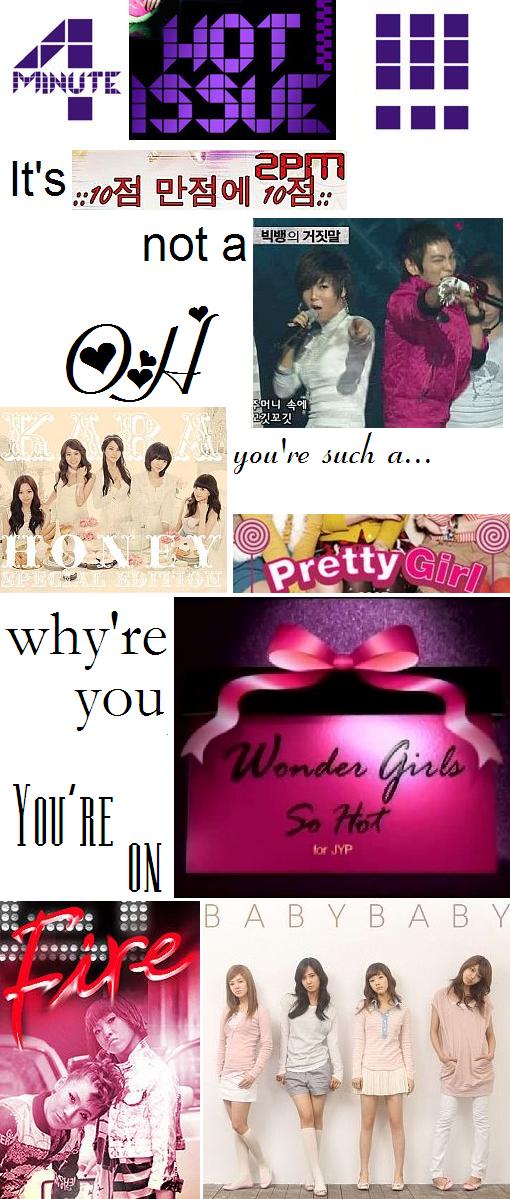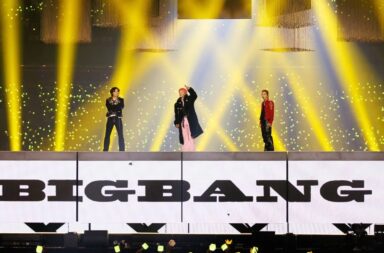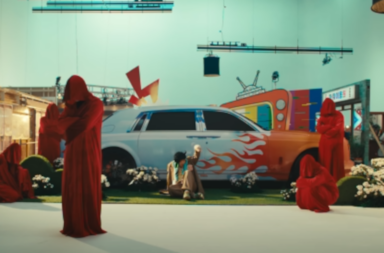This may seem a little redundant but I felt it was time to address the issue of what is becoming quite apparent in K-pop. This comes after K-pop’s seen strong forerunners like Shinhwa, Fin.K.L, S.E.S and H.O.T and has much to do with the mish-mash of pop being generated in the current youth-dominated music scene. Note: these do not include the geniuses of independent and underground music which are in a class of their own.
A quick browse through my iTunes and I can already name all the hits that eventually became digital chart toppers, music show encores and/or parody favorites. For instance, there’s the legendary (annoying) “Tell Me”, which spawned the Wonder Girls‘ successful trilogy with “So Hot” and “Nobody”; and their understated hit “Irony” (which has up to now been the only song that has properly showcased their vocals), “Gee” which saw SNSD‘s official rise to the top, KARA‘s cutesy-whiny “Rock U”, “Pretty Girl” and “Honey (which almost don’t cut it for sounding exactly the way they are)”, SHINee‘s “AMIGO”, Hyori‘s hit “U-Go-Girl”, Super Junior‘s “Sorry Sorry”, 2PM‘s “Again & Again”, Big Bang & 2NE1‘s “Lollipop”, the girl group’s recent hit “I Don’t Care”, and the list goes on.
The tons of other similar hits out there, of what I deem as the minor ones, range from Son Dam Bi‘s “Crazy”, 2PM’s “10 points out of 10”, Big Bang’s “Lie” and SHINee’s “Noona You’re So Pretty (Replay)” to recent ones like SNSD’s “Tell Me Your Wish (Genie)”, After School‘s “AH”, 2NE1’s “Fire” and 4Minute‘s “Hot Issue”, et cetera. Maybe it’s because I’m writing in the point of view of someone who isn’t fluent in Korean but these secondary hits have their plus and minus points. They may have struck gold at home but the fact that majority of these songs had hangul titles could have had me siphoning them out of the major hits list – which incidentally trumps the number of minor ones.
From the amassed tracks, what immediately became clear was the fact that they’ve all got similarities between them. A brief scribble had me noting things like “repetitiveness”, “pop over ballads”, “innovative (sometimes cheesy) choreography”, “catchy Engrish phrases embedded in lyrics” and not forgetting also their common romanized titles. Other bonus factors contributing to utter addiction were the abundance in (variety show and civil servant) parodies and frequent exposure on the various music programs (with the exception of 2NE1). Although that’s not to say that nationwide or even global interest in the songs got me clapping with glee, I can’t say I wasn’t affected at all. I’ve come to the conclusion that subconsciously, everyone likes having random English words and phrases drummed into their heads, while simultaneously learning those nifty dance-steps.
http://www.cyworld.com/skytenn2/2866228 (KBS’ Happy Sunday ahjussis covering 2PM’s A&A)
Some of these major ones actually got me and a friend counting exactly how many times the Engrish phrases were repeated throughout the song (what can two bored people do on a long boring train ride?). Our brief, inaccurate statistics turned out to be rather distinct markers of these stand-outs in the horde of K-pop music. And oddly, with the rise of Konglish tunes (most notably “Nobody” and “Gee”), recognition of K-pop in my immediate circle of friends ballooned to unexpected proportions.
I think it’s safe to say that JYP was the front-liner for this trend, starting off the Wonder Girls with “Irony” and then turning English titles into a full-blown fad that has had other managements/composers following suit. The lyrics to these songs also came as a surprise to a foreigner like me when I could actually hum and sing-a-long even if it was just to those few words that didn’t actually make much sense on their own. On hindsight, I think it gradually became a given to expect each impending comeback with a headlining Engrish track. But I’d have to give credit to the people who have been steadily improving the standards of Konglish and it’s grammatical correctness.
And so, a once reluctant people who admired-yet-feared socializing in English became unconsciously fascinated with Konglish songs. This turned the spoke of the K-pop wheel, producing a myriad of hits that has seen music of the Hallyu wave spreading farther and wider.
On a more personal note, I’m a very melody-over-lyrics, and no-go-for-emo-music person so it’s been easy for me to adapt to the ways of K-pop – although I think what got me into studying the hangul characters was due entirely to the fact that I knew absolutely zilch what DBSK was singing in “O – Jung Ban Hap”. Meaning and articulation-wise. Yes, I was a late starter. Occasionally, I cringe at the thought that at my age I can be found raving about teeny-bopperish music. But what to do when K-pop is just so adept at making one addicted?
That’s my two-cents on the floor. I’m sure many of you have different thoughts on the matter. So what exactly makes you tick?



